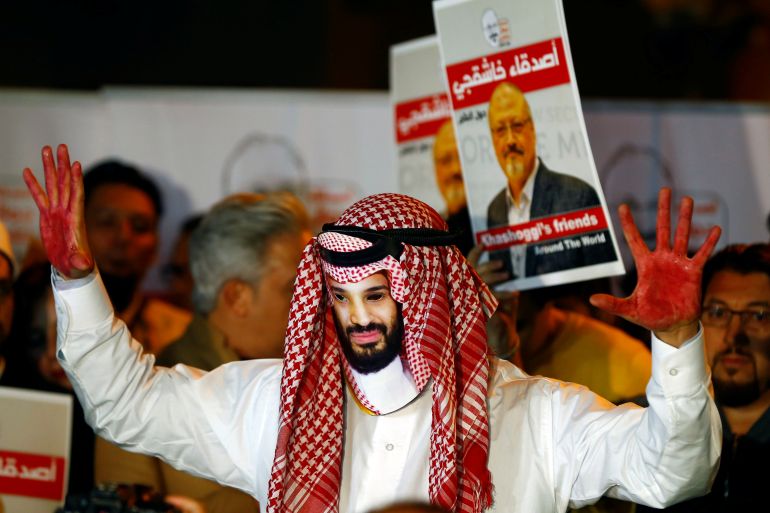Saudi Arabia’s image-building efforts suffer another setback
Saudi Arabia’s presidency of this year’s G20 is no longer the golden PR opportunity Crown Prince Mohammed bin Salman dreamed of.

The glory days are over for Saudi Arabia. The announcement that the G20 summit in November will now take place virtually will surely have disappointed Crown Prince Mohammed bin Salman (MBS) and the Saudi authorities. Without the coveted photo-ops or the chance to roll out the red carpet for foreign dignitaries and business leaders, the prince’s attempts to promote the image of Saudi Arabia as a modernising and progressive member of the international community have suffered yet another setback.
Human rights supporters do not share the crown prince’s disappointment. Instead, this shift provides another opportunity and spotlight to build on campaigns urging G20 governments and delegates not to let the occasion distract them from the kingdom’s long list of abuses, including the gruesome murder of journalist Jamal Khashoggi two years ago.
Keep reading
list of 4 itemsSaudi Arabia’s Riyadh selected to host World Expo in 2030
Qatar’s emir receives Saudi Arabia’s foreign minister on an official visit
Saudi Arabia’s e-sports looking to nurture its own hit games
The path looked brighter when MBS was initially elevated to the position of crown prince in 2017. Immediately, he embarked on a relentless PR offensive to “enhance the image of the kingdom internationally”. His “Vision 2030” project, an ambitious and costly plan aimed at diversifying the country’s economy and attracting foreign investment, was integral to this strategy. The project has included introducing a lavish programme of sports and entertainment – including huge concerts with Mariah Carey, Enrique Iglesias and David Guetta, and mega-sporting events like the Dakar Rally, the Spanish Italian Super Cup and WWE professional wrestling – together with some superficial social reforms, to turn attention away from the egregious human rights abuses that have taken place under his watch.
However, MBS’s rehabilitation project stalled when it became clear that the new gilded sheen of Saudi Arabia was undergirded by the same (if not worse) disregard for the most basic human rights. The war in Yemen, expected by the Saudi authorities to last only a few months, has gone on now for more than five years and created the world’s worst humanitarian crisis; the prince’s “anti-corruption” drive and the Ritz-Carlton arrests of 2017 alarmed foreign investors and led many to pull their businesses out of the country; and MBS’s brutal crackdown on dissent, including the arrests and torture of women human rights defenders and the shocking murder and dismemberment of Khashoggi in the Saudi consulate in Istanbul; sparked an outcry from the international community.
After the murder of Khashoggi in October 2018, the kingdom’s bad press began to snowball. In 2019, a landmark joint statement by 36 United Nation member states addressing the regime’s blatant abuses underlined this turning of the tide, urging the Saudi authorities to “take meaningful steps to ensure that all members of the public, including human rights defenders and journalists, can freely and fully exercise their rights to freedom of expression, opinion and association, including online, without fear of reprisals”. This was soon followed by a second UN statement, while the European Parliament passed resolutions protesting against Khashoggi’s murder and the arbitrary detention and torture of women’s rights activists. As a result, several countries decided to embargo arms sales to the kingdom. The US Congress also proposed ending arms sales, in addition to condemning the kingdom for its human rights violations in Yemen and its abuses against Saudi dissidents and US citizens.
Last year’s announcement that Riyadh would host the G20 this year presented another glorious opportunity to boost the country’s image and woo international friends and investors. But much to the crown prince’s dismay, the international community has not embraced him. To date, more than 220 civil society organisations from around the world have decided to boycott the G20 civil society engagement process, and in response to the NGOs’ campaigning the mayors of London, Paris, New York and Los Angeles pulled out of the U20 summit of global city chiefs.
Meanwhile, the European Parliament, members of the US Congress, and national parliaments of other G20 states have urged their representatives to boycott the meeting, conveying the message loud and clear that we can no longer go back to business as usual. At the UN, pressure has been increasing with a third joint statement demanding genuine reform on human rights; and this October, Saudi Arabia lost its bid for a seat on the UN Human Rights Council, signalling that the international community will no longer tolerate serious rights abuses. Lastly, the election of Joe Biden, who has promised to end arms sales to the Saudi authorities and hold them accountable for the murder of Jamal Khashoggi, also means that the Saudi government no longer has carte blanche to act as they please without US scrutiny.
As nations and their stakeholders continue to press upon the dire importance of human rights within the kingdom, Saudi Arabia must learn to understand the cost of upholding personal freedoms.
For now, Saudi Arabia’s presidency of the G20 is no longer the golden PR opportunity MBS dreamed of. And thanks to the tireless efforts of advocates, elected officials and especially Saudi dissidents, MBS and the Saudi monarchy’s calculus – that they can disregard the human rights of Saudi citizens without consequence – may finally be forced to change.
The views expressed in this article are the author’s own and do not necessarily reflect Al Jazeera’s editorial stance.
